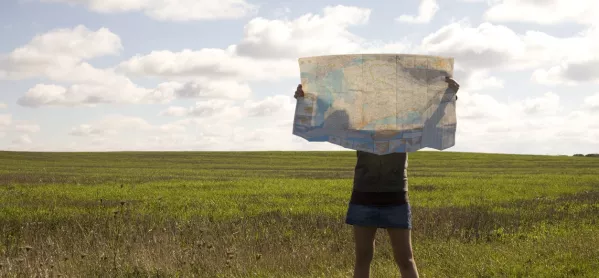- Home
- Going to an off-site CPD event? Pack a compass. And tea
Going to an off-site CPD event? Pack a compass. And tea

It’s probably been some time since you last went to an external, face-to-face training event. Most continuous professional development takes place at the end of a long school day or at the end of a computer terminal...also at the end of a long school day.
So you’ll want to squeeze the absolute maximum out of the experience. Pre-course reading? You’ve already nailed it.
But it’s all too easy to overlook the larger challenges involved not just in getting to the venue, but coping with the way they (whoever they are) do things there.
I’m not just talking about fire procedures, important though they are.
Seizing lateness from the jaws of punctuality
How many times have you left home with an hour or more to spare and managed to seize lateness from the jaws of punctuality?
How frustrated have you been, pacing up and down anonymous streets, still looking for your destination, 30 minutes into the event you’ve been looking forward to for weeks?
Even the most seasoned of panel members and delegates - the educational tourists - can come a cropper on their travels. Google directions look idiot-proof online - the hidden snags don’t emerge until you start the journey.
For those of us travelling by train, the longest part of the journey is relatively straightforward...as long as we’re not travelling in winter, spring, summer or autumn.
But emerge from the security of the fuggy carriage on to the concourse, and the whole journey on foot can fall apart before it’s even begun.
Losing one’s bearings
No station ever contains a compass to show which way North is, let alone South, East and West, so it’s all too easy to lose your bearings. And most stations have at least two exits - or entrances, depending which way you’re going.
Google Maps is wonderfully precise about the names of streets and numbers of roads to follow, and distances even down to the number of feet to travel before you get to the next turning.
If only the original road builders and signposters had been as precise. Searching for street names is as hard as looking for a needle in a haystack. And when - as so often happens in the grand metropolis (or anywhere else, to be honest) - there are roadworks, the street name can be covered completely. Or the name is 500 yards further on - where you don’t need it.
Asking for directions often doesn’t help. You can’t always guarantee that you will catch a local resident, and people working in the shops are as much strangers to the place as you are.
Goodness knows how you all got here - or how you’re going to get home. Touchingly, receptionists at other venues will get out their phones and use their data to direct you.
I’ve even had help from the refuse collectors, who’ve magically produced a map to show me the way. There’s nothing like the human touch.
Magical squares of plastic
The venue may afford some degree of safety, but you shouldn’t allow your guard to drop. The look of puzzlement on the receptionist’s face often makes me wonder whether I’ve come on the right day or whether the course has been completely cancelled.
It’s a heart-stopping moment - until they check on screen and bring out the magic clipboard.
Most places have turnstiles that can be turned by the magic visitor’s square of plastic.
Mislay it at your peril: I’ve never known anyone incarcerated for the night, but it can be a close call. I’ve been formulating my escape plan. Should I vault the barrier, or try to do the limbo underneath, knee joints permitting?
The euphemistically named “facilities” are often anything but. The most luxurious set of cubicles I’ve encountered were non-gendered, set into the wall, doors floor to ceiling. Inside there was everything you need. All seemed delightfully private and commodious.
As long as you can wave across the right light to flush the toilet and at the right distance from the light censor to wash off the soap, all is well.
It’s interesting to note that in the most upmarket venues towels are making a comeback. I wonder if anyone has discovered just how eco-unfriendly those electric-powered driers are - and whether the noise pollution is a factor.
Not for delicate palates
Having crossed the threshold you usually notice that caffeine in one form or another and biscuits are provided. Water is rather harder to come by.
Coffee is the best bet. Tea offers a real challenge to those of us with a more delicate palate, who prefer the teabag to have a mere nodding acquaintance with the hot water, and who insist on a generous deluge of milk.
Consumers of builders’ tea are fine - the consistency of the liquid in the readymade thermos borders on the soup-like.
And now - beverage in one hand, plastic pass in the other - you have survived the rigorous pre-course initiative test, and you’re ready to relax, learn and enjoy yourself. At least until it’s time to go home.
Yvonne Williams is head of English and drama in a secondary school in the South of England. She has contributed chapters on workload and wellbeing to Mentoring English Teachers in the Secondary School, edited by Debbie Hickman (Routledge)
Keep reading for just £1 per month
You've reached your limit of free articles this month. Subscribe for £1 per month for three months and get:
- Unlimited access to all Tes magazine content
- Exclusive subscriber-only stories
- Award-winning email newsletters



